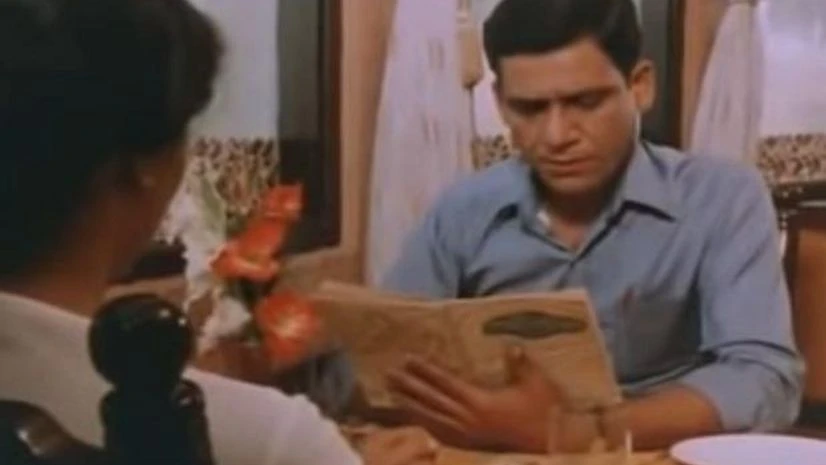The first time we hear of Inspector Mike Lobo — a minor character in Govind Nihalani’s Ardh Satya, played by Naseeruddin Shah — we are not even told his name. A few officers at a police station in Bombay (now Mumbai) describe his attributes: “He used to act too smart. He looked down upon the world. He used to say, ‘I’ll kill whoever stops me from doing my duty.’” Another one quips: “This is what happens when you live in the water but get into trouble with the alligator,” indicating that whoever they are discussing got into trouble with powerful people, possibly politicians, and is now out of the job.
We see Lobo a few scenes later, in a drunken brawl at a restaurant where he cannot pay for what he has eaten and drunk. “Don’t you know who I am?” he screams, “I am a police officer”. Also present at the restaurant is Ardh Satya’s protagonist, Sub-Inspector Anant Velankar (Om Puri), who pays off Lobo’s bill and lends him some money as well. As the film progresses, Lobo keeps appearing, always drunk, each time in a worse state than before, getting into fights, begging money. “My wife died this evening,” he tells Velankar once when the sub-inspector and his fellow officers are getting out of a restaurant and leaving in a taxi. The last time we see Lobo is when Velankar discovers his body on the side of a road.
At the beginning of the film, Velankar is a sharp contrast to Lobo; he is an honest, enthusiastic young officer, uncompromising in his duty. In the opening scenes where he meets college lecturer Jyotsna Gokhale (Smita Patil) and later drops her home on his motorcycle, Velankar tells her that he does not drink. But as he gets more and more embroiled in the impossible situation of policing under pressure from corrupt senior officers and the nexus of politicians and criminals, he sinks into alcoholism, being drunk even on duty. His senior, Inspector Hyder Ali (Shafi Inamdar), asks him: “What have you thought about yourself? Do you want to drink to death? You want to be like Lobo?” At another instance, after he gets drunk — at the same restaurant where he paid off Lobo’s bill — and gets into a brawl, Ali tells him: “Haven’t you ever seen Lobo?” Velankar’s predicament is somewhat like Abhimanyu in Mahabharat, stuck inside the chakravyuh, as referred to in this poem by Dilip Chitre which inspired the title of the film:
More From This Section
Last week, Sanjiv Bhatt, a former senior officer, was convicted in a 30-year-old murder case by a sessions court in Gujarat. The murdered man’s family has alleged that he died after being tortured by Bhatt and several other police officers. The Hindu reported (‘Sacked IPS officer Sanjiv Bhatt gets life term in 1990 custodial death case’): "A court in Gujarat on Thursday sentenced dismissed IPS officer Sanjiv Bhatt to life imprisonment in a custodial death case dating back to 1990... In 2011, Bhatt said in his affidavit to the Supreme Court that he was part of the meeting called by (the then Chief Minister) Mr (Narendra) Modi following the Godhra train attack... He claimed that at the meeting, Mr Modi asked the administration to go slow on and allow “the majority community to vent out their anger against the minority community.” In 2011, the Supreme Court cleared Modi of any involvement in the riots.
This case of a custodial death prompted me to re-watch Ardh Satya this week, where Velankar is eventually suspended after he tortures a suspect to death in custody. The angry young police officer pitted against the system was something of a mainstay in Hindi cinema by the time Nihalani’s film was made. Prakash Mehra’s Zanjeer, which had catapulted Amitabh Bachchan to superstardom as the ‘Angry Young Man’ had given voice to an entire generation’s frustration. Bachchan was, in fact, the first choice for the role finally played by Puri. But, unlike the more mainstream depiction of upright police officers, Ardh Satya — written by Vijay Tendulkar — is gritty. Velankar is realistically flawed, unable to check his alcoholism or his anger — and eventually, that’s the reason for his tragedy.
The source of his anger is the patriarchal world he inhabits. Anger and violence are almost written into his DNA. He has grown up being bullied by his overbearing father (Amrish Puri), a police constable who indulges in rampant domestic abuse. As a young man, Velankar had no desire to become a police officer; instead he wanted to be an academic. However, he is compelled to take up this profession when his father beats up his mother. His inability to intervene fills him up with shame at what he perceives to be cowardice. Late in the film, he reveals his predicament to Jyotsna when he tells her that he doesn’t want to be napunsak (impotent).
Yet, all the forces in the narrative seem to conspire to make him one. His senior officers prevent him from taking action against criminals with political connections. One officer takes a bribe from a factory owner and puts him on duty to evict labourers on strike. He is assigned to provide security to criminal Rama Shetty — Sadashiv Amrapurkar in a break-out role — when he wins a local election. In the end, he has to request Shetty to get him out of trouble. The last scene where Velankar has to climb several flights of stairs to reach Shetty’s flat because of an out-of-order lift owes a debt to the climax of Satyajit Ray’s Seemabaddha (1971). In both scenes in these films the protagonists climb up but their ascent is ironic: in reality, they are sinking. Velankar’s final act of violence, where he strangles Shetty, is cathartic, releases him from his impotent stupor, but also seals his fate.

)
